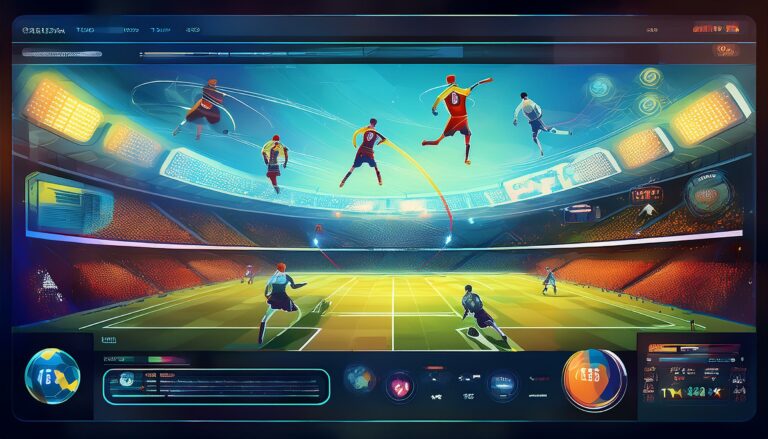The Psychology of Parlays: Understanding Multi-Leg Bets
Play99exch, Allpaanel: In the realm of multi-leg betsvarious factors play a crucial role in shaping decision-making processes. One significant aspect influencing these decisions is the individual’s level of risk tolerance. Those with a higher tolerance for risk may be more inclined to place larger bets on multi-legged outcomesseeking greater rewards despite the increased likelihood of losses. Converselyindividuals with lower risk tolerance may opt for safer bets with lower potential payoutsprioritizing the preservation of their initial investment.
Additionallythe availability heuristic can impact decision-making in multi-leg betswhere individuals tend to rely on readily available information when making choices. This cognitive bias may lead bettors to favor outcomes or teams that are more frequently covered in the media or have a stronger presence in their consciousness. Such bias can skew decision-making processes and potentially lead to unfavorable betting outcomes if not balanced with a more comprehensive analysis of all available information.
Cognitive biases in parlay betting
Parlay betting introduces a myriad of cognitive biases that can impact decision-making processes. One common bias is the overconfidence effectwhere bettors tend to overestimate their knowledge or predictive abilities when placing multi-leg bets. This overconfidence can lead to making riskier choicesignoring potential pitfallsand ultimately affecting the overall success of the bet.
Another prevalent bias is the anchoring biaswhere individuals rely heavily on the first piece of information they receive when making decisions. In parlay bettingthis bias may manifest as fixating on initial odds or outcomeseven in the face of contradictory evidence. This anchoring effect can skew judgment and prevent bettors from objectively reassessing their choices based on new information.
The role of risk perception in parlay bets
When it comes to parlay betsrisk perception plays a crucial role in influencing decision-making. Parlay bets involve combining multiple single bets into one larger betwhich inherently increases the level of risk involved. This heightened risk perception can lead bettors to either embrace the challenge and bet larger amounts for potentially higher rewards or opt for saferindividual bets to minimize losses.
Due to the complexity and uncertainty of multi-leg betsindividuals may perceive the risks differently based on their own comfort levels and past experiences. Some bettors may perceive parlay bets as thrilling opportunities to win bigwhile others may view them as unnecessarily risky and prefer the predictability of single bets. Understanding how risk perception shapes betting decisions can shed light on the psychological factors at play in parlay betting behavior.
Emotional influences on parlay betting behavior
Emotions play a significant role in the decision-making process of parlay betting. In the heat of the momentbettors may experience heightened levels of excitementleading them to place impulsive bets without careful consideration. The thrill of potentially winning big can overshadow rational thinkingcausing individuals to deviate from their original betting strategy.
Converselyemotions such as fear and anxiety can also impact parlay betting behavior. The fear of losing money or missing out on a perceived opportunity can lead bettors to make decisions based on avoidance rather than sound reasoning. This can result in hesitant or overly cautious bettinghindering the ability to capitalize on potentially lucrative betting opportunities.
The impact of past wins and losses on future parlay bets
Past wins and losses have a significant impact on future parlay bets. Winning streaks can lead bettors to feel overconfident and more likely to take risksoften increasing the size of their bets. On the other handa series of losses can cause bettors to become more cautious and hesitant in their decision-makingsometimes even leading to a decrease in the amount wagered.
Moreoverpast outcomes can influence bettors’ emotional stateaffecting their judgment and risk-taking behavior. Positive experiences from past wins may lead to a sense of euphoria and a desire to replicate that successpotentially clouding rational thinking. Converselyconsecutive losses can result in frustrationimpulsive decision-makingand attempts to recoup losses quicklywhich can lead to more aggressive betting strategies.
Social influences on parlay betting decisions
Individuals engage in parlay betting within a larger social framework that can heavily influence their decision-making process. Social influences play a significant role in shaping how bettors perceive risk and make choices when placing multi-leg bets. Friendsfamilyand even online communities can impact one’s decision to place parlay betsaffecting the level of risk-taking behavior exhibited by individuals in this setting.
Moreoverobserving peers or celebrities successfully navigate parlay bets can create a social norm that encourages others to take similar risks. This phenomenon can lead individuals to make decisions based on social comparisons rather than purely rational calculations of odds and probabilities. The social context in which parlay betting occurs can thus exert a powerful sway over an individual’s willingness to engage in such high-riskhigh-reward forms of gambling.
The psychology of chasing losses in multi-leg bets
Chasing losses in multi-leg bets is a phenomenon that many bettors experience. When a bettor is on a losing streakthere is a natural inclination to try to recoup those losses by placing more bets in quick succession. This behavior is driven by the desire to regain the lost money and to end the losing streak as quickly as possible. Bettors may feel an increased sense of urgency and impulsivity in their decision-making as they chase their lossesoften ignoring rational judgment in the heat of the moment.
The act of chasing losses can lead to a vicious cycle where bettors continue to make risky decisions in hopes of turning their luck around. This behavior can be detrimental not only to their bankrollbut also to their emotional well-being. As losses accumulatebettors may experience heightened feelings of frustrationanxietyand disappointmentwhich can further fuel the urge to chase losses even more. It is important for bettors to recognize when they are falling into the trap of chasing losses and to implement strategies to regain control over their decision-making process.
Strategies for managing emotions in parlay betting
Recognizing the influence of emotions in parlay betting is crucial for successful outcomes. Emotions such as excitementfearand overconfidence can lead to impulsive decision-makingresulting in poor choices that may undermine the overall strategy. To manage emotions effectivelybettors should strive to maintain a rational mindset and avoid making decisions based on gut feelings or temporary fluctuations in mood.
One effective strategy for managing emotions in parlay betting is to set clear and realistic goals before placing any bets. By establishing specific objectives and limits for both wins and lossesbettors can maintain a sense of control and discipline throughout the betting process. Additionallytaking breaks during intense betting sessions can help individuals regroup and refocus their emotionsenabling them to make more informed decisions based on logic rather than impulsive reactions.
The importance of self-control in multi-leg betting
Self-control plays a crucial role in multi-leg betting as it can help bettors make rational decisions and avoid impulsive actions that may lead to losses. In the context of parlay betsmaintaining self-control involves setting limits on the number of bets placedthe amount wageredand the frequency of betting. By exercising self-disciplinebettors can prevent themselves from chasing losses or succumbing to emotional impulses that could cloud their judgment.
Furthermorepracticing self-control in multi-leg betting involves being able to walk away from potential bets that do not meet one’s predetermined criteria for a favorable wager. This means resisting the urge to bet on impulse or out of frustrationand insteadmaking calculated decisions based on sound analysis and strategy. By mastering self-controlbettors can enhance their overall betting experience and increase their chances of long-term success in the world of parlay betting.
The psychology of analyzing odds and probabilities in parlay bets
Analyzing odds and probabilities in parlay bets involves a complex interplay of cognitive processes. Bettors must carefully evaluate the likelihood of multiple events occurring simultaneously to determine the overall probability of their multi-leg bet being successful. This task requires a keen understanding of basic probability principles and the ability to discern value in the offered odds.
Successful parlay bettors often exhibit a strong grasp of statistical concepts and are able to make informed decisions based on the available information. By objectively evaluating the odds and probabilities of each individual event in a multi-leg betbettors can make more rational and calculated choices. This analytical approach can help bettors avoid common pitfalls such as overestimating their chances of winning or being swayed by emotional factors.
What are some factors that can influence decision-making in multi-leg bets?
Factors such as personal biasesrisk perceptionemotional influencespast wins and lossesand social influences can all play a role in how individuals make decisions in parlay bets.
What are some common cognitive biases that can affect parlay betting?
Common cognitive biases in parlay betting include overconfidence biasconfirmation biasand availability biaswhich can lead individuals to make irrational decisions when placing multi-leg bets.
How does risk perception impact parlay betting behavior?
Risk perception can affect how individuals assess the likelihood of certain outcomes in parlay betsleading them to either underestimate or overestimate the risks involved in multi-leg bets.
What role do emotions play in parlay betting decisions?
Emotions can influence decision-making in parlay bets by affecting individuals’ risk tolerancedecision-making processesand overall behavior when placing multi-leg bets.
How can past wins and losses impact future parlay bets?
Past wins and losses can create a sense of overconfidence or fear in individualsleading them to either take more risks or avoid certain bets when placing multi-leg bets in the future.
What are some strategies for managing emotions in parlay betting?
Strategies for managing emotions in parlay betting include setting limitstaking breaksstaying disciplinedand focusing on rational decision-making rather than being swayed by emotions when placing multi-leg bets.
Why is self-control important in multi-leg betting?
Self-control is important in multi-leg betting to prevent impulsive decisionsmanage emotionsand stick to a predetermined betting strategy when placing parlay bets.
How can individuals analyze odds and probabilities effectively in parlay bets?
Individuals can analyze odds and probabilities effectively in parlay bets by conducting thorough researchunderstanding the concept of expected valueand using statistical tools to assess the likelihood of outcomes in multi-leg bets.







